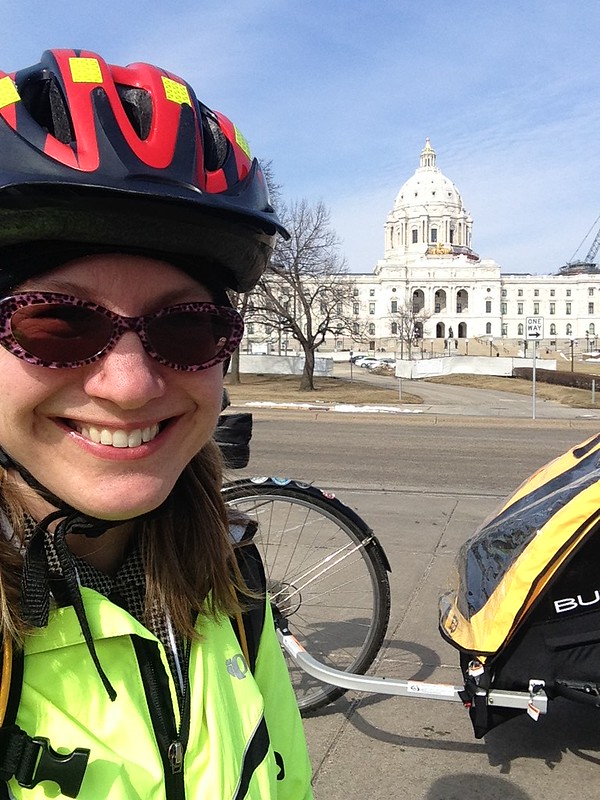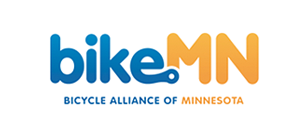2024 Legislative Agenda

BikeMN’s 2024 Legislative Agenda
(Stay tuned for the actual bill numbers in January)
BikeMN 2024 Legislative Agenda / Narrative (draft- Jan23)
After a historically productive 2023 legislative session, BikeMN is looking forward building on our long term advocacy efforts to make MN a place where walking, biking, and rolling are safe, easy, and convenient for all. To that end, we are focusing our attention on three areas where we’ve identified potential room for improvement during this legislative session.
SAFETY & EQUITY
Firstly, the Safety and Equity of people walking, biking, and rolling will always be a top priority for our organization, and there are a number of policy ideas we’ll be introducing to support this priority. These policy suggestions include decriminalization of jaywalking, clarifying language on allowable electric-assist mobility devices, including bicycle and pedestrian safety requirements for driver’s education, increasing school zone safety, expanding photo enforcement, stricter penalties for moving violations and restrictions on right turns at a red light. Each of these policy requests are aimed at creating a safer transportation landscape for all road users.
LAND USE
Secondly, we have identified policies concerning Land Use as an important area for continued progress. In general, policies affecting land use largely determine how spaces are/not allowed to be used or developed and what purpose(s) a particular space can be used for. With respect to transportation and mobility, policies about land use not only impact the space occupied by transportation infrastructure, but the areas next to and served by that infrastructure. BikeMN believes that denser development and shorter distances between destinations improves quality of life for everyone. In particular, BikeMN is interested in the impacts of policies regarding on-street and off-street parking, building height and density regulations, and zoning requirements. The effects of our current land use policies have forced residents to be vehicle dependent to travel throughout their communities for their activities of daily living, to the detriment of the health, safety, and livability.
CLIMATE/ENVIRONMENT & REDUCED VMTs
The third priority for the upcoming session is making sure our state stays on track for the much-needed Climate and Environmental goals, including greenhouse gas emissions (GHG) and reduced vehicle-miles traveled (VMT). There is widespread recognition that the existing status quo of our transportation is not serving our residents equitably, and is unsustainable. Minnesota’s existing roads and highways represent a massive unfunded maintenance liability that our state simply has not budgeted for. Minnesota has a stated goal of reducing GHG 80% by 2030 compared to 2005 levels. Because the transportation sector, and in particular personal automobiles, are a primary contributor ofGHG, our Department of Transportation has set a goal to ”reduce the number of VMT across Minnesota per capita 14% by 2040.” To meet or exceed these admirable goals within the timeline, we need to ensure that transportation plans and policies are held accountable
We expect that the Legislature this session will be focused primarily on policy as opposed to funding, and BikeMN’s priorities for state advocacy reflect this. As we near the beginning of session, we’ll be soliciting legislative allies to author and carry bills that will include specific policies as described above. Stay tuned for updates and action alerts and of course we hope you’ll be able to attend our 2024 MN Walking & Biking Summit on March 14th!
2023 Issues Detailed Below For Your Reference:
2023 Bill Dooley Bicycle Safety ActOmnibus Biking and Walking Improvements Bill (H.F. 677 (Elkins) S.F. 912 (Morrison 677):
This 2023 omnibus bill (a bill comprising several items) is named in memory of BikeMN’s long-time advocacy chair and board member Bill Dooley. It includes language from many of the previous bills BikeMN supported that did not pass. The 2023 effort will continue to push for items not yet passed in years prior, both policy and funding provisions. House Transportation Committee Chair Frank Hornstein successfully added some one-time safe routes and active transportation funding in the 2021 Omnibus Transportation bill. In 2023, BikeMN is asking for MnDOT’s base budget to be increased from $1.5 million for Safe Routes to School to $10 million and the Active Transportation Program to be increased from $0 to $25 million. The other items in HF 677/SF 912 include:
HF 677 (Elkins); SF 912 (Morrison, Dibble, Fateh, Port) Article 1. Bill Dooley Bicycle Safety Act
- Requires MnDOT to allocate at least 110% of the federal authorization for Transportation Alternatives to that program.
- Appropriates $10 million to safe routes to school infrastructure grants from a bonding bill.
Article 2, School-Related Related Active Transportation
- This provision (also a stand-alone bill, HF 678 (Elkins) SF 911 (Morrison) requires bike/walk education to be taught in schools. It was introduced as a separate bill because it will be sent to the education committee. The other provisions in HF 677/SF 912 only need to be heard by the transportation committee. Currently, school districts and nonpublic schools that transport students by school bus at public expense MUST provide bus safety training and MAYalso provide student bicycle and pedestrian safety education for students enrolled in kindergarten through fifth grade. BikeMN supports changing this MAY to MUST. Many school districts, including those with one or more of the 1,000 educators have been trained statewide to teach the Walk! Bike! Fun! elementary school safety curriculum, is already exceeding this requirement. We want to ensure that all students receive bicycle and pedestrian safety information, even if it is at a lower level than Walk! Bike! Fun!
- The local authority to set school speed limits originally in this bill will be addressed in a separate bill also authored by Representative Steve Elkins.
Article 3 – Active Transportation Policy
- The first part of this article requires MnDOT to continue to lead by providing active transportation design guidelines, active transportation planning assistance, and technical assistance to local governments.
- The next section formally establishes the Mississippi River Trail and the Jim Oberstar (now known as the North Star Route) as State Bikeways.
- The next section is about passing a bicycle. It resolves the differences between 169.18 Subdivisions 3 and 5 saying that the passing distance when overtaking bicycles requires at least three feet or half of a vehicle’s width when passing.
- the poorly understood as far to the right as practicable language ins changed to as far to the right as the bicycle operator determines is safe. This complies with national best practices.
- Following that the law makes it legal for bicyclists to proceed straight through an intersection from a right-hand turn lane without turning right.
- Section 7 is the stop as yield for bicycles (also referred to as the Idaho Stop)
- Section 8 reauthorizes the MNDOT Active Transportation Advisory Committee (
- Section 9 requires the first $500,000 appropriated for active transportation to be spent to develop, maintain, and implement active an transportation safety curriculum for youth ages five to 14 years old, and if remaining funds are available, for (1) youth ages 15 to 17 years old, (2) adult active transportation safety programs, and (3) adult learn-to-ride programs. The curriculum must include resources for teachers and must meet the model training materials requirements.
Article 4 – Appropriations for Active Transportation
- Appropriates $10 million/year for Safe routes to school and $25 million for active transportation as an ongoing appropriation from the state general fund. This is done with the intention of funding much of the match for the federal Transportation Alternatives program and increasing program as well as infrastructure investment.
Bike Policy Bill – HF ??? (Lillie) and SF ??? (Carlson in 2023)
This bill (currently being redrafted for 2023) was introduced for the past few years in a row. It has passed the House each year but last year the Senate Transportation Committee did not schedule it for a hearing in years prior. There are several policy changes in it that BikeMN feels will make things safer for people biking. It is exactly the same bill that passed the House 122-0 in 2019. Many of the changes were recommended as best practices by the National Conference of State Legislatures and the League of American Bicyclists. It makes the following changes:
- Centralizes and makes consistent the definition of Bikeway.
- Clarifies that traffic laws apply to those riding on the shoulder and that bicycles in a crosswalk have the rights and duties of a pedestrian.
- Resolves the differences between 169.18 Subdivisions 3 and 5 saying that the passing distance when overtaking bicycles requires at least three feet or half of a vehicle’s width when passing.
- Changes the poorly understood as far to the right as practicable language to as far to the right as the bicycle operator determines is safe.
- makes it legal for bicyclists to proceed straight through an intersection from a right-hand turn lane.
Safe Routes to School Bonding
Safe Routes to School Bonding HF 1108 (Murphy) and SF 1223 (Senjem) the stand-alone bonding bills for $10 million for SRTS. There will be similar bills in 2023.
Omnibus Traffic Safety Bill
The Minnesota Safety Council is proposing, among other things, a limited pilot program for speed camera enforcement implemented along work sites.
Metro Sales Tax for Transit, Biking, and Walking
The Sierra Club drafted a letter, which BikeMN and MoveMN helped initiate calling on the Governor to implement a Metro Area sales tax of one cent with 10% dedicated to biking and walking and $187,000 million of other dedicated funding for Greater Minnesota transit, biking, walking initiatives, programs, and funding support. Another 15-20 organizations have signed on to the letter through the Minnesota Environmental Partnership’s sign-on process.
Bicycle Safety Stop (AKA Idaho Stop)
The only policy provision in our Omnibus Bill that is not in the stand-alone policy bill. We believe this would need to go to the public safety committee. Read more about the policy language here.

Help keep Minnesota walk, bike, and transit-friendly by joining us on Thursday, March 14, 2024 for the Minnesota Walk Bike Summit!
2023 Legislative Agenda Recap
The entire speaker portion can be viewed here on youtube. Click here for 2023 agenda and details.
2022 Legislative Agenda
2021 Legislative Agenda
The 2021 Summit was entirely virtual and free. You can view the entire playlist on our YouTube page here.
2020 Legislative Agenda
FUNDING ISSUES
- Support including $10 million for Safe Routes to School infrastructure grants in the bonding bill and an allocation from the General Fund for Active Transportation grants in the budget bill
- amending current Minnesota Statutes (Chapter 123B.90 (e)
- -School District Powers and Duties) to change that May to Must to require inclusion of
- biking and walking safety training in addition to requiring school bus safety training?
POLICY ISSUES
- Amend Minnesota Statutes to change May to Must require inclusion of biking and walking safety training in addition to requiring school bus safety training
- Support giving local authorities the power to lower speed limits on all roads adjacent to school property
- Update the electric-assist bicycle definition and operation statutes to reflect the national best practices for the three classes of E-bikes currently being sold
2019 Legislative Agenda
FUNDING ISSUES
- Support the inclusion of $30 million for Active Transportation grants in the budget and/or bonding bill with a minimum of $1 million per year for planning, education, and other program-related activities
- Support $6 million for Safe Routes to School infrastructure grants in the bonding bill and an increase in MnDOT’s base budget from $500,000/yr to $750,000/yr for program-related grants
POLICY ISSUES
- Hands-Free Cell Phone
- Include walking and biking in the goals to reduce greenhouse gas emissions from the transportation sector
- Ensure the 3-foot passing law applies to shoulder users, make it legal for a bicyclist to ride through a right turn lane without turning, and allow the bicycle operator to determine how far to the right it is safe to ride
2018 Legislative Agenda
FUNDING ISSUE
- Support both the inclusion of $6 million for Safe Routes to School infrastructure grants and the trail priorities outlined by the Parks & Trails Council and the Met Council in the bonding bill
POLICY ISSUES
- Address distracted driving through the Hands-Free Cell Phone Law
- Include funding for bicycling and walking in any transportation funding package passed by the Legislature through a dedication of the sales tax paid on bicycles and bike parts, equaling about $15 million each year, to proposed state-level active transportation grant programs
2017 Legislative Agenda
FUNDING ISSUES
- Requests for SRTS funding in MN far exceeded available state and federal dollars; in 2015 there were $14.6M in requests, but just $5M available, primarily through federal resources. We asked for an additional the inclusion of $6 million in the bonding bill for Safe Routes to School infrastructure grants.
- BikeMN also encouraged the inclusion of $3.6 million in the bonding bill for improvements to the Cuyuna State Recreation area and another $8 million for State Trails in Greater MN and $5 million for Metro Regional Parks and Trails.
- BikeMN asked for the reauthorization of the Statewide Health Improvement Partnership (SHIP) program.
POLICY ISSUES
- Hands Free Cell-Phone Law
- MnDOT Bike Law Task Force
- School Buses in Bike Lanes
- Safe Passing
- Urban Bike Lane Permits
2016 Legislative Agenda
FUNDING ISSUES
- Include funding for pedestrian and bicycle infrastructure and programs in any transportation funding package approved by the legislature this session
POLICY ISSUES
- Fund Minnesota’s Safe Routes to School program with $6 million to provide students with sidewalks and safe street crossings
2015 Legislative Agenda
FUNDING ISSUES
- Transportation Funding Should Include all Modes Including Walking and Bicycling
- Walking and Bicycling MnDOT Grant Program
POLICY ISSUES
- Riding and Passing Rules
- State Aid Roadway Design Standards
- Enhanced Penalties/Vulnerable User
- James L. Oberstar State Bikeway
Resources

Talking to your Legislators and Elected Officials
Find who represents you and suggested tips for talking with your elected leaders
Learn More

Apply for a Scholarship and Travel Stipend
Don’t let the cost of attendance or distance be a barrier! Scholarships and travel stipends are available. Learn More
[BikeMN’s] advocacy work has had a remarkable impact throughout the state! We need to push cities and towns to be more bicycle and pedestrian friendly – Minnesota could use more sidewalks in rural areas, more traffic calming strategies, more bike rail guards on city streets, bike and pedestrian plazas, and curb cuts! – BikeMN Advocacy Member
